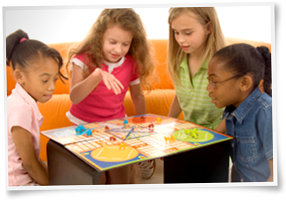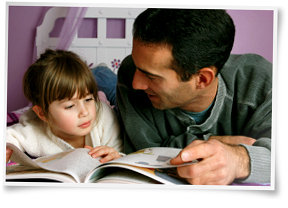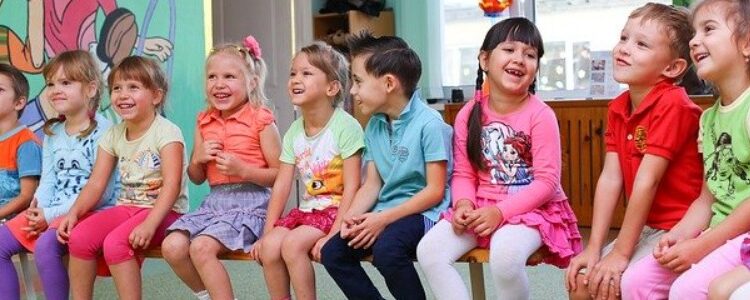Early Childhood Development: Early Social and Emotional Development
Children learn best when they are comfortable in their environment. When children feel comfortable, they can relax in their surroundings and concentrate on the lessons being taught.
Important Social Skills For Children
There are many specific social and emotional skills that children must possess to be comfortable at school, including:
- Separating easily from parents.
- Sharing materials and taking turns.
- Helping others.
- Demonstrating empathy and caring.
- Respecting people and their personal materials.
- Staying focused and on task during a lesson.
- Complying calmly with directions from authority figures.
- Attempting to solve problems before asking others for help.
- Verbally communicating needs and ideas accurately.
Making Comfort a Priority
All children have a strong need to feel that they fit in and belong with their peer group. Because of its importance, children will strive to meet this need before turning their attention to other matters, such as learning.
For example, if a child is uncomfortable being away from his parents or if he does not feel that other children like him, he will likely become tense and distracted. When this happens, he will instinctively devote his energy towards managing those emotions and away from focusing and learning during instruction time.
This is the same phenomenon that happens to many children in their pre-teen years. For example, I am never surprised when I hear about the smart, motivated, preteen girl who goes from getting straight As (and wearing her hair in a messy ponytail) to getting Bs and Cs (and spending an hour each morning in the bathroom with a can of hairspray and a disturbingly large collection of eye shadow and lip gloss). As her interest in boys increases, she becomes increasingly insecure at school. This unease in the classroom is the precise reason for her sudden inability to focus in school and actually, um, like, you know, learn.
Tips for Accelerating Your Child’s Social and Emotional Development
Social and emotional skills typically develop through practice and exposure to different social situations. The older your child is, the more time he has had to experience different social situations.
The best way for you to help accelerate your child’s social and emotional development is to intentionally place him in a variety of social situations such as:
- Play dates with one or more children at your home.
- Play dates with one or more children at a friend’s house.
- Playtime at a park or communal playground.
- Trips to the bank, post office, or other “adult” errand.
- Music, cooking or other age-appropriate classes led by an instructor.
When hosting a play date, your child will have the opportunity to share his toys. A favorite train, for example, is his own toy when he is alone at home. But when other friends are over, your child will be expected to allow others to play with the train. Also, when playing a game with other children, your child will have the opportunity to practice taking turns. This includes both being patient while another child makes a move and making his own move in a timely and courteous manner.
When hosting a play date, consider allowing your child to select a few toys to put away before his friends arrive. By giving your child the opportunity to put away his most-special-amazing-and-favorite-in-the-whole-world toy, you are also giving your child the opportunity to select which toys he will share with his friends. By giving your child some control in selecting toys, he will be more likely to share those toys happily, rather than feel as though he was forced to share.
If your child and his playmate are interested in playing a game, encourage the children to play a game such as Chutes and Ladders or Candy Land, since these games require no special abilities to succeed and each player has an equal opportunity to win. For older children, consider games such as Memory or Sorry!, which require only a basic skill set and most children will still have an equal ability to succeed.

When attending a play date at another child’s house, your child will have the opportunity to practice taking direction from another adult, as the adult hosting the playgroup will likely have his or her own plans and rules. While jumping on a bed or climbing on a sofa might be acceptable at your home, for example, your child will need to follow a “no climbing on furniture” rule in place at another child’s home. Attending a play date at a friend’s house also gives your child practice separating from his parents, which will help ease any separation anxiety that might surface during the first few days of a new school year.
When participating in a group class or activity, your child will have the opportunity to practice meeting new children in an unfamiliar environment. Arriving at a new class requires your child to walk into an unfamiliar room filled with unfamiliar faces, introduce himself to the other children, and engage in group activities. This experience is very similar to what he will experience during the first weeks of a new school year. Also, your child will have the opportunity to practice taking direction from another adult, as the leader of the class gives instructions for how to complete the specific activity.
When accompanying you on a trip to the post office or other adult errand, your child will have the opportunity to practice his patience. For many children, their entire day is filled with child-centered activities. A trip with an adult to a “child-unfriendly” destination such as a post office or bank will help your child realize that there are times when he will be expected to wait quietly and patiently while others around him complete an activity.
In addition to actually putting your child in a new social situation, you can create hypothetical social situations for your child through books, movies, and stories. For example, when reading stories to your child, pause during the story to discuss how certain characters may be feeling. For example, is the main character sad, frustrated, nervous, scared, happy, surprised or excited? By encouraging your child to discuss the feelings of fictional characters, you will accelerate his general awareness that all people have feelings and that all feelings are important.

Learn More About What Will Be Expected of Your Child in School
Children are expected to develop social and emotionally during the preschool and kindergarten years. At the beginning of preschool, it is expected that children may initially be fearful about being away from their parents. However, after a few days, children should be able to play peacefully alongside other children. By kindergarten, children should be capable of separating easily from their parents, sharing materials with classmates, showing empathy for others’ feelings and attempting to solve problems without first seeking a teacher’s help.
Beginning of Preschool
During the first week of school, teachers understand that many children will be anxious when separating from their parents. However, teachers expect that children will separate from their parents with some hesitation and be willing to engage in the activities presented by the teacher. Even for children who become upset at the moment their parents leave the classroom, teachers expect that these children will calm down within five or ten minutes.
After just a few weeks of school, children are expected to interact comfortably with their peers by sharing classroom materials, taking turns and cooperating in play and work situations. Children will likely need some adult supervision and assistance to help initiate or facilitate peaceful and productive group work. Additionally, some children may need assistance from an adult to calm down during a stressful situation, such as when another child is working with an item they wish to have or when a child is unable to complete a specific task. With an adult’s assistance, children should be able to calm down within a few minutes.
Children are expected to display patience and self-control. This includes, for example, following directions to remain seated and wait patiently while the teacher is working with another child. Some children may need to be reminded to wait patiently. However, after receiving one reminder, teachers expect that children will wait patiently without becoming upset. Children are expected to follow all classroom rules and to respect all property in the room.
Beginning of Kindergarten
Teachers understand that children may feel nervous during the first week of school. They are in a new
classroom and may used a more flexible routine from the summer. As with the beginning of the preschool year, it is not uncommon for some children to cry on the first day of school. However, by the second day of school, it is expected that children will recall the familiarity of a classroom environment and enter the room without hesitation. Even children who did not attend a preschool program should be comfortable in the classroom by the second or third day of school, as they see other children working confidently. Children are also expected to separate easily from their parents on the occasions when parents visit the classroom to drop off a birthday snack, to read a book to the class or for other special events.
Children will be expected to interact comfortably and independently with peers in play and work situations without adult assistance. An adult may be needed to begin the group work by suggesting a game or preparing the materials required for an activity. However, once the activity has begun, children will be expected to productively complete the activity without needing further assistance.
Children should attempt to solve personal problems (from locating a missing jacket at recess time to resolving minor conflicts with friends) independently before asking a teacher for help. Kindergarten students are expected to demonstrate empathy by recognizing others’ feelings and being willing to help a friend who is upset or needs assistance.
Children are expected to share materials, take turns, respect others’ ideas and collaborate comfortably with a group of their peers. Children are also expected to be able to wait patiently for needed help, if the teacher is working with another child. It is expected that children will not cry when they are frustrated or disappointed.
